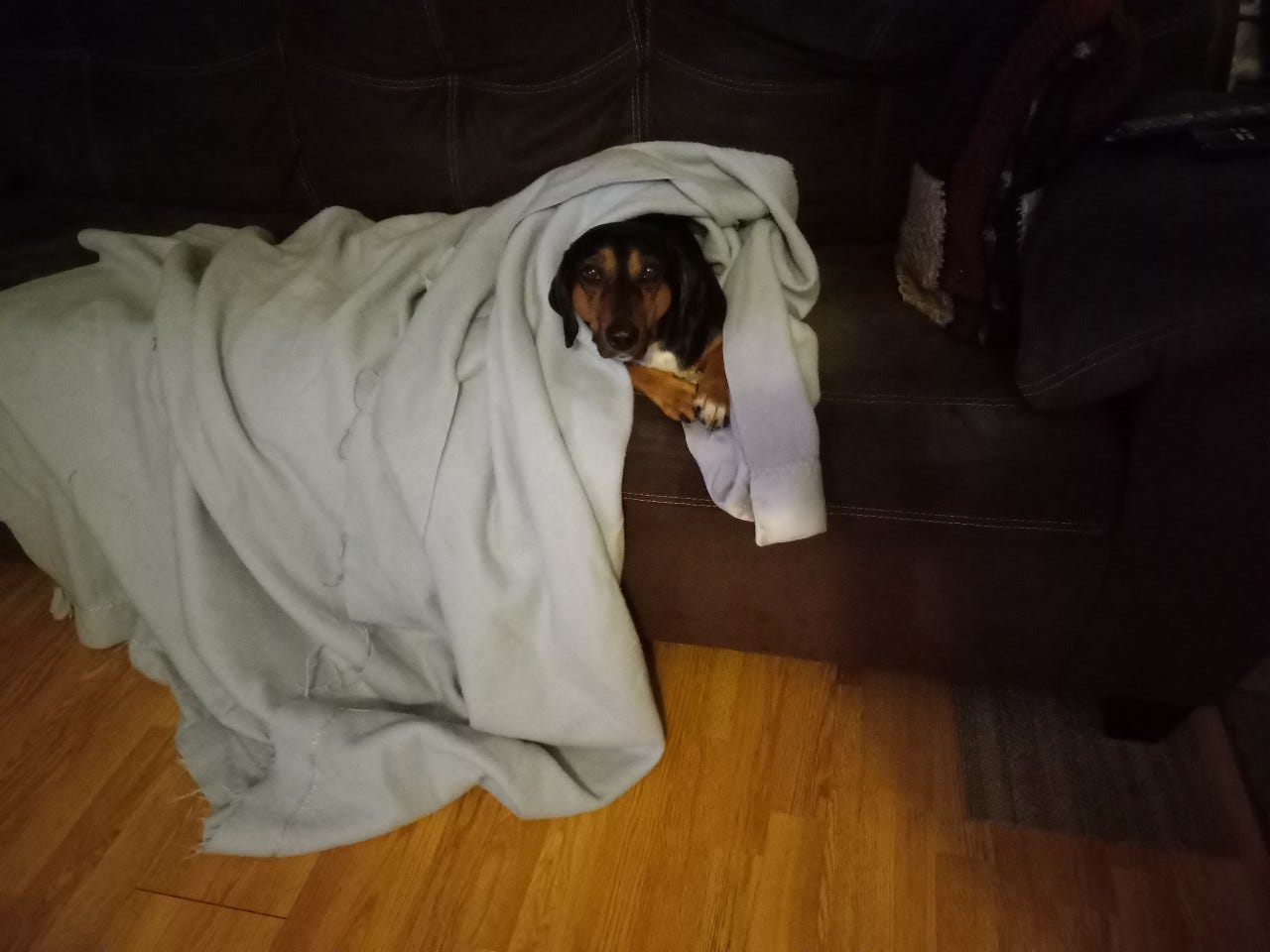Dogs are nosy, not afraid of being in the dark
How I realized my dog is not terrified to eat in a dark kitchen
Every time I walk a dog in the late afternoon or evening, I pause at the light switch and the lamps. Some owners leave their lights on. Others don’t. I always want to flip the light switch on in case the owner comes home at night, but I don’t. Their house, their decision.
In my first year with Junee, I genuinely thought that she was scared of the dark. I adopted her on Juneteenth (hence the name), right in the middle of summer. She was OK with being fed in the kitchen then, mainly just from being a greedy puppy. Plus, my curtains were wide open and sunlight shined through.
When it started getting darker (and colder) earlier during Chicago’s fall and winter, I noticed she kept filling her mouth with food, marching to her crate or my rug, spitting it all out, and eating each piece individually. I knew the kitchen was darker as the time changed, but I wasn’t going to leave the range hood light (the light underneath a microwave or overhead vent) on 24/7. I installed a motion detector light and marched her back into the kitchen to eat all of her food in there so I didn’t risk getting any bugs. Then, she started eating in the doorway with the light glowing behind her.
Recommended Read: “5 ways to get your clingy Velcro dog to give you some space ~ The upside and downside of interactive dog cameras”
But I was really scratching my head about why she wouldn’t eat in the dark. I’d read multiple articles talking about how impressive a dog’s night vision is, but that wasn’t the reason for my confusion.
ADVERTISEMENT ~ Amazon
As an Amazon affiliate, I earn a percentage from purchases with my referral links. I know some consumers are choosing to boycott Amazon for its DEI removal. However, I enjoy promoting intriguing products from small businesses, women-owned businesses and Black-owned businesses who still feature their items on Amazon. All four of my Substack publications include a MINIMUM of one product sold by a VERIFIED Black-owned business. If you still choose to boycott, I 100% respect your decision.
Junee tagged herself in as my pet — and new mom
From the age of 15 to 16, I’d grown used to my mother shaking me awake and asking, “Did you take your contacts out?” I’d be so crabby from her waking me up to ask me this, but she did it anyway. Eventually, she realized she could go the easier route and just open my contact solution case. If she didn’t see contacts floating inside, she knew they were still on my eyes, and she’d shake me like Tina Turner so I didn’t wake up with dry eyes. (No matter what contact companies tell you, it’s never a good idea to sleep with anything covering your pupils besides eyelids.) In college and in my first off-campus apartment, I had to get into the habit of taking my contacts out at a certain time.
Nowadays, my dog does the same thing on occasion. If she sees me napping, fully clothed, contacts on and hair not wrapped — with all the lights on — I’ll hear a low growl while I’m trying to sleep on one of my couches. I used to ignore it. I thought she was growling so I got off the couch and she could sleep there instead of my loveseat. If the low growl didn’t work, I would feel paws smacking on my shoulder or arm.
However, I started noticing a pattern. She only does this after midnight until I stand up and get ready for a night shower. It is the most bizarre alarm clock, but she has dutifully helped me avoid waking up with yesterday’s clothes on and looking for contact eye drops. Additionally, when I go to sleep at night, she always gets comfortable in any room that is completely dark. If I get another burst of energy after a night shower and want to use my reading lamp, she’ll storm out of her bedroom crate and go sleep in her living room crate (or the couch) in a pitch black living room.
So what’s up with her opposition to eating in the dark?



